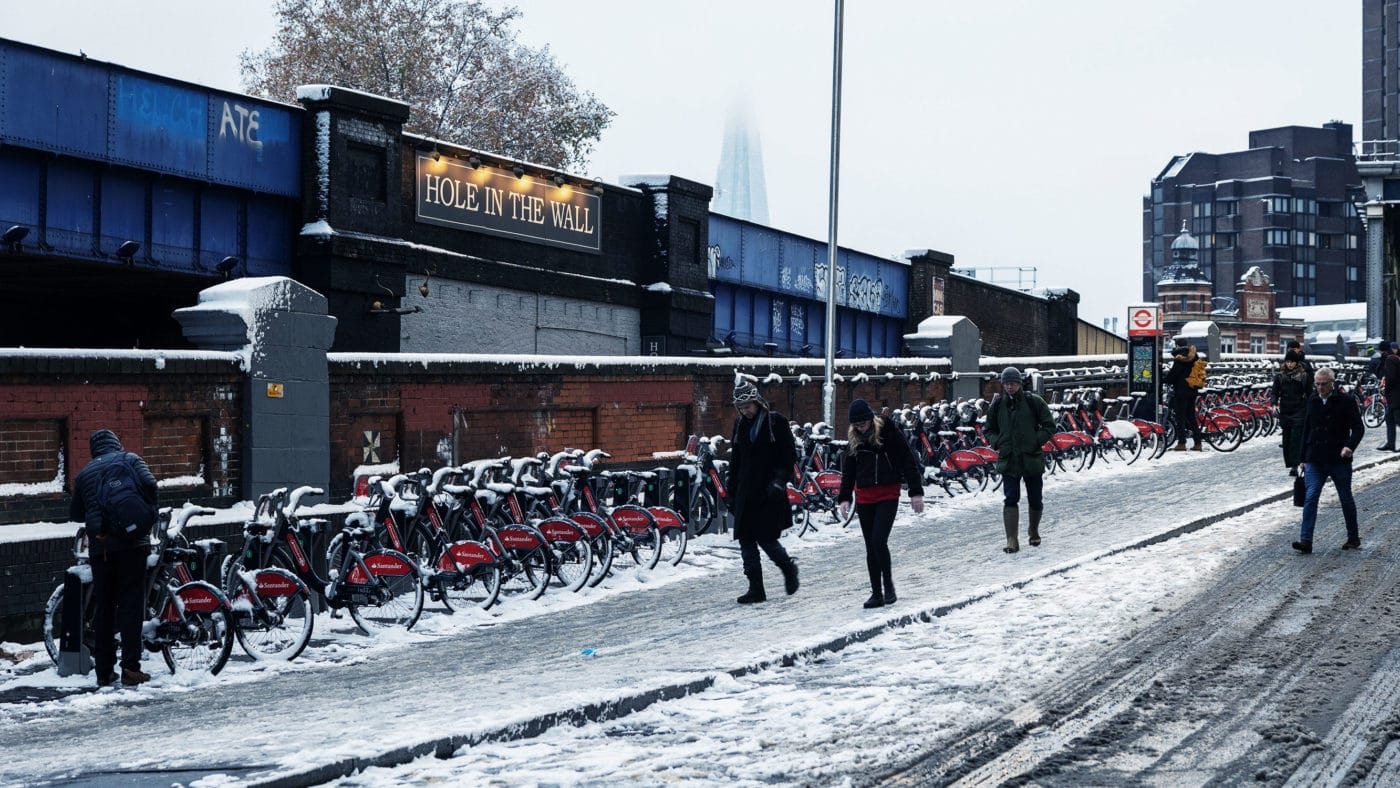One of life’s little pleasures is watching Londoners drive after a spot of light snow. There is a curiously balletic quality to a Range Rover gliding gently across the road to bump into a set of metal railings accompanied by melodious swearing from the driver, not unlike an elephant attempting to take up ice-skating. We need this enjoyment, because on these snow days nothing else in the UK seems to work.
Our houses fail miserably at the basic task of keeping us warm without burning half a North Sea gas field, trains are blocked, schools close, motorways back up for miles when cars are still capable of driving, flights are delayed, and the country settles into a sort of prolonged sulk interrupted only by smug columnists pointing out how this is just another example of broken backlog Britain failing to prepare for the glaringly obvious.
Perhaps uniquely, this is actually a little unfair. Why is our capital so woefully prepared for snow? The answer is simple: it doesn’t need to be. The UK gets about 16 days a year where snow settles on the ground, and London gets even fewer. Britain is blessed with a mild climate, and this is one of the benefits; economically disruptive weather extremes are uncommon. The common refrain that ‘snow is hardly an unpredictable problem, so why aren’t we prepared for it’ is slightly off target; we know it’s going to snow, it’s just rarely worth investing large amounts specifically against the one or two days a year when snowfall is heavy enough to significantly affect activity.
If this seems odd, remember that we make similar decisions in our personal lives. How many drivers are willing to incur the effort and expense of switching to winter tyres, rather than just relying on the usual set year round? That the British state makes similar decisions on a national basis isn’t that unreasonable.
To the extent that snow does highlight problems with the UK, it’s in a slightly more oblique manner. Some – not all – of the problems people complain about in cold weather are the result of strains in the system highlighting flaws which can otherwise be concealed. Housing is, as ever, an excellent case in point. In the summer, our homes are too hot; we tell ourselves that they’re built for the cold. Then in the winter, we find that we’ve got Europe’s worst insulation. Well, perhaps they’re built for that brief window in spring when the temperature outside is just about bearable.
The actual answer is that British houses are just old. We have the oldest housing stock in Europe, and very possibly in the first world. We can spend as much as we like improving insulation and heating systems, but we’re still limited by the structural constraints of our buildings. And many of them are not very good at keeping in heat. This is just about tolerable most of the time; sure, our energy bills are higher than they would be, but rarely catastrophically so for most people. And then a price shock hits in a period of cold weather, and we suddenly realise just how bad things are. To the extent that this is an issue of state behaviour, the blame lies with the planning system that has locked us into this substandard stock.
Similarly, malfunctioning transport networks are a legacy of older investment decisions. The UK operates the world’s largest third rail network, with trains drawing power from direct contact with an electrified conductor rail running alongside the tracks. There is a reason that this system is not so popular elsewhere; it doesn’t work if trains can’t maintain good contact (if, for example, ice or leaves get on the line), and most of the energy pumped into it is lost as heat. The reason we have this standard is that we chose it in the 1920s, locked into it at an early stage, and it would cost an absolute fortune to move away. Again, pre-existing flaws from older decisions are highlighted by relatively infrequent weather events.
As for the NHS, it’s probably a case of least said, soonest mended; the primary problem there isn’t that it can’t cope with snow or ice, but that it can’t cope with winter at all. Or, frankly, autumn, spring, or summer. Fixing that particular mess would involve an almost full institutional redesign, from funding to allocation.
On the whole, this is probably mixed news. On the plus side, it turns out we’re not uniquely bad at dealing with the snow. In the minus column, it’s because our country is riddled with rigidities and flaws which are shown up in glaring manner by bad weather. Still, at least it’s pretty.
Click here to subscribe to our daily briefing – the best pieces from CapX and across the web.
CapX depends on the generosity of its readers. If you value what we do, please consider making a donation.


